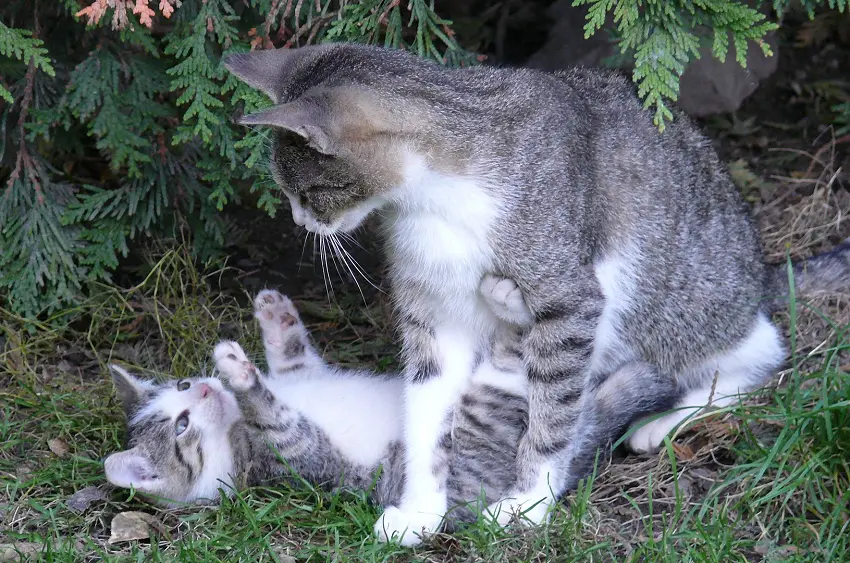Why Is My Cat Separating Her Kittens? 5 Possible Explanations
Cats have amazing maternal instincts for caring for their litter upon birth. But why is my cat separating her kittens instead?
As with humans, mother cats could have unusual behavior towards their offspring. Some cats will be overprotective while others may move one kitten or separate the kittens all over.

Moreover, mama cats will sometimes need the help of their humans, especially if they have a large litter. And if you’re wondering why your feline is doing this, the following points may help explain the situation.
Reasons why cats separate their kittens
Almost every cat behavior has an explanation. When it comes to a mother cat separating its kittens, the following might be the reasons behind:

1. Some of the kittens are sick.
The most common reason why a mother cat would separate its kittens is if one or more is sick. In the wild, felines do this to prevent other kittens from getting infected.
Take note that mother cats will usually separate the weakest kitty. You should track where the mother cat will abandon the runt, so you can save it through manual feeding.
Overall, cats have a mind-blowing ability to sense whether or not their kittens will survive. If the mama cat feels that one of its kittens is too weak to survive, she will separate it to save the rest of the litter.
If you are to take care of the abandoned kitty, you have to get milk made specifically for kittens. This kitten formula can be bought from pet stores or the nearest vet clinic.
2. The litter is too big.
Sometimes, a very big litter may force a mother cat to separate its kittens. This happens when the litter has more kittens than the mother cat’s nipples.
In this case, the mother cat will feel overwhelmed. To ease the stress, the feline will bring some of her kittens to separate places.
As mentioned earlier, mother cats will usually separate the weakest kittens. It may seem cruel, but it’s a survival instinct of animals since they have limited resources in the wild.
Aside from that, a mother cat is more likely to separate kittens if it’s in a stressful situation. So if your pet cat is expecting a large litter, you should try to keep it as comfy as possible.
3. The mother cat perceives a threat.
Another possible reason why a mother cat would separate its kittens is because of a potential threat. In this case, the mother kitty may try to protect its kittens by hiding them in separate areas.
Since mother cats only move their kittens one a time, there’s a chance that some might be dropped in different spots. This is much so if the mother cat becomes distracted in the middle of moving a kitten.
Take note that bringing the kittens back to the nest won’t help in this situation. You have to tackle the threat, so the mama cat will be comfortable bringing the kittens back to their original location.
So what could potentially threaten a mother cat? It can be the presence of another pet, loud sounds, too much foot traffic, or the scent of another animal on your clothes.
4. The mother cat is keeping the nest clean.
It’s also possible that the mother cat is just looking for a cleaner nest for her kittens. It may appear as if she’s separating the kittens halfway through the process.
Take note that mother felines will usually seek a new place after a few days upon giving birth to the litter. It’s because the original nest will be too soiled and will pose a health threat to the kittens.
Even if the nest doesn’t seem smelly to you, it’s important to understand that cats have a strong sense of smell. They can easily sniff if there’s something wrong or unusual on their nest, especially if it indicates dirt or pathogens.
5. The mother cat is disoriented.
The process of whelping can be very disorienting for mother cats. This can cause mental stress to the feline, leading to her bringing the kittens to different spots.
Overall, this is highly occurring to cats during and shortly after birth to its litter. The best thing you can do is watch closely and see where the mama cat brought her kittens.
How to stop your cat from separating its kittens
Technically, there’s no way you can stop a mother cat from moving its kittens. After all, it’s part of their instincts and protective nature, which will help the litter survive.
The best thing you can do is monitor where the mama cat brings the kittens and assist from there. If the mother feline rejects any of the kittens, it’s your job to care for them and increase their survival rate.
Moreover, you should avoid removing the kitten right away. It’s possible that the mother cat isn’t done relocating the entire litter yet.
It’s best to wait for about an hour and see if the mother cat will be back. If not, you should bring the abandoned kitten to the vet to have it checked for potential illnesses.
How do you know if a mother cat is rejecting its kittens?

A mother cat will usually reject a kitten if it’s separating it from the rest of the litter. Also, the mama feline may refuse to nurse or groom the said kitten even if it does so for the others.
Aside from that, you may see the mother cat hissing at the rejected kitten in an effort to drive it away. It’s best to interfere at this point to prevent harm to the rejected kitty and to reduce the stress on the mother cat.
It’s important to keep a close watch here as the rejected kittens often turn out to be the runts or weakest links.
Conclusion
Why is my cat separating her kittens? It can be due to a dirty nest, a potential threat, stress, or the kitten being sick.
Whatever the reason is, it’s best to monitor and watch closely first. If the mother cat rejects a kitten from the litter, you must intervene to ensure that the kitty will survive.
